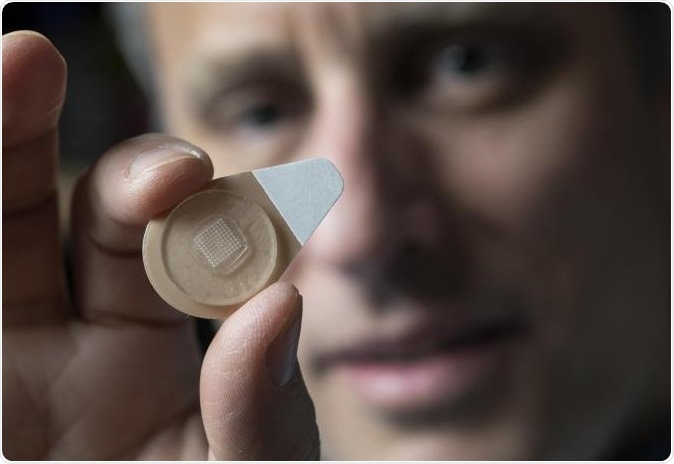Most birth control methods involving hormones involve daily intake of pills. Long acting contraceptive methods that involve implants or intrauterine devices (IUDs) need regular visits to the doctor and are not as acceptable to many women. Researchers at the Georgia Tech have developed a medical patch that contains hormones for birth control. This patch can be applied over the arm or leg for a few seconds and it can provide contraception for a month.

Regents Professor Mark Prausnitz holds an experimental microneedle contraceptive skin patch. Designed to be self-administered by women for long-acting contraception, the patch could provide a new family planning option. (Credit: Christopher Moore, Georgia Tech)
If approved, this self-administered patch could become a boon for women looking for long acting contraceptive. There are tiny dissolvable and biodegradable microneedles on the underside of the patch that can implant into the skin of the user. The implant helps delivering the hormone levonorgesterel - a synthetic progesterone. The basis for this device is same as devices used for “needle free vaccines”. The results of the study looking at the use of the device were published in the latest issue of the journal Nature Biomedical Engineering. The study was financed by Family Health International (FHI 360) under the aegis of the U.S. Agency for International Development (USAID).

An experimental microneedle patch is shown next to a blister pack of birth control pills. Designed to be self-administered by women for long-acting contraception, the patch could provide a new family planning option. (Credit: Christopher Moore, Georgia Tech)
Mark Prausnitz, a professor in the bioengineering program on the team said in a statement, “There is a lot of interest in providing more options for long-acting contraceptives… Our goal is for women to be able to self-administer long-acting contraceptives with the microneedle patch that would be applied for five seconds just once a month.”
He explained that the long acting contraceptives including IUDs and implants need medical supervision. The researchers write, “However, these formulations generally require administration by trained professionals, thereby limiting patient access, and safety is hampered by possible needle re-use and needle-based injuries. These issues are particularly important in developing countries.” Research has shown that only 7 percent of the adolescents use long acting reversible contraceptives. Most teenagers use unreliable contraceptive methods such as birth control pills (which they often miss) and condoms.
According to the researchers the patch that can be pressed on skin would be priced around a dollar per dose. The team tested the patch on laboratory rats. On using the patch for a few seconds there was smooth absorption of the hormone and birth control was provided for a month. The team writes, “Instead of injecting sustained-release formulations by needle and syringe, a microneedle patch is briefly and painlessly applied to the skin to break off and embed biodegradable microneedles for the slow release of contraceptive hormone.”
The team is working with Micron Biomedical to develop the contraceptive device. Prausnitz said, “We do not yet know how the contraceptive microneedle patches would work in humans… Because we are using a well-established contraceptive hormone, we are optimistic that the patch will be an effective contraceptive. We also expect that possible skin irritation at the site of the patch application will be minimal, but these expectations need to be verified in clinical trials.” The patch would deliver hormones for up to six months and also made to deliver the drugs for one week.